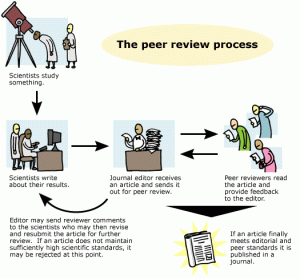
Earlier this year, Mark Maslin quit the editorial board of Scientific Reports over peer review. Roughly 150 other science professionals threatened to do the same. The cause? Ethical controversy over the reputability of peer review.
Maslin, as reported by Maclean’s, became aware of an issue when the journal’s publisher, Nature Publishing Group, announced it would begin a pilot program of “fast-tracking” scientific papers to give authors an answer within three weeks. For some scientific papers, that is too fast—impossibly fast. Maslin, a climatology professor at the University College London, knew that this would lead to errors slipping through.
The scientific community is facing an issue of retracted papers like never before. Retraction Watch, a simple blog, tracks scientific paper retractions by the dozen. It seems there is a “peer-reviewed” scientific paper retracted for experimental errors or fudged math every day. So how do reputable journals and publishing groups continue to make these grave errors?
There’s a lot of money in scientific publishing. Scientists pay a fee to have their studies reviewed by the editorial board of reputable sources and another fee to have it published. Profit-oriented publishers have preyed on scientists and researchers, seizing on any opportunity to publish the papers for the fees than any actual scientific merit. The best part is that there is little repercussion for the journals—nearly all the ill light is spilled upon the researchers if the paper is proved false.
In fact, these publishers are so aggressive that a professor from Harvard University last year performed a test. He submitted a false paper, filled with random generator text and authors named Pinkerton A. LeBrain and Orson Welles, for peer review. None of the sentences even made sense, but 17 medical journals accepted the paper and offered to publish it if he only would pay $500 for the publishing fee.
We might all just shake our heads at this if the consequences were not so dire. Public policy and education are based upon scientific studies. News reports terrify families through the television screen and radio with the latest findings, and as we know from the anti-vaccination movement, a failure to properly review scientific process can last for years. A new opinion piece in Nature urges climatologists to maintain their integrity when fitting their facts to the figures, and vice versa Considering that the Senate recently voted against general scientific consensus that climate change is, in fact, not caused by humans, the importance of fact-based, impartial research has never been higher.
Instead, researchers need to embrace the fact that their conclusions might be wrong and journals must reform their integrity. The responsibility lies with both the scientists and the publishers on that front.
The result to us is that we must not treat science as a one-and-done. No single study is conclusive. That is why scientific consensus is paramount to the furthering of the understanding of the world. Revolutionary studies, the ones that first indicate how something about the world may work, are pilots into uncharted waters. No explorer fully understands the depths of what he has found on his own; everything is the result of many people’s observations and reports. Such is science: An understanding of the world drawn from the eyes of many.
